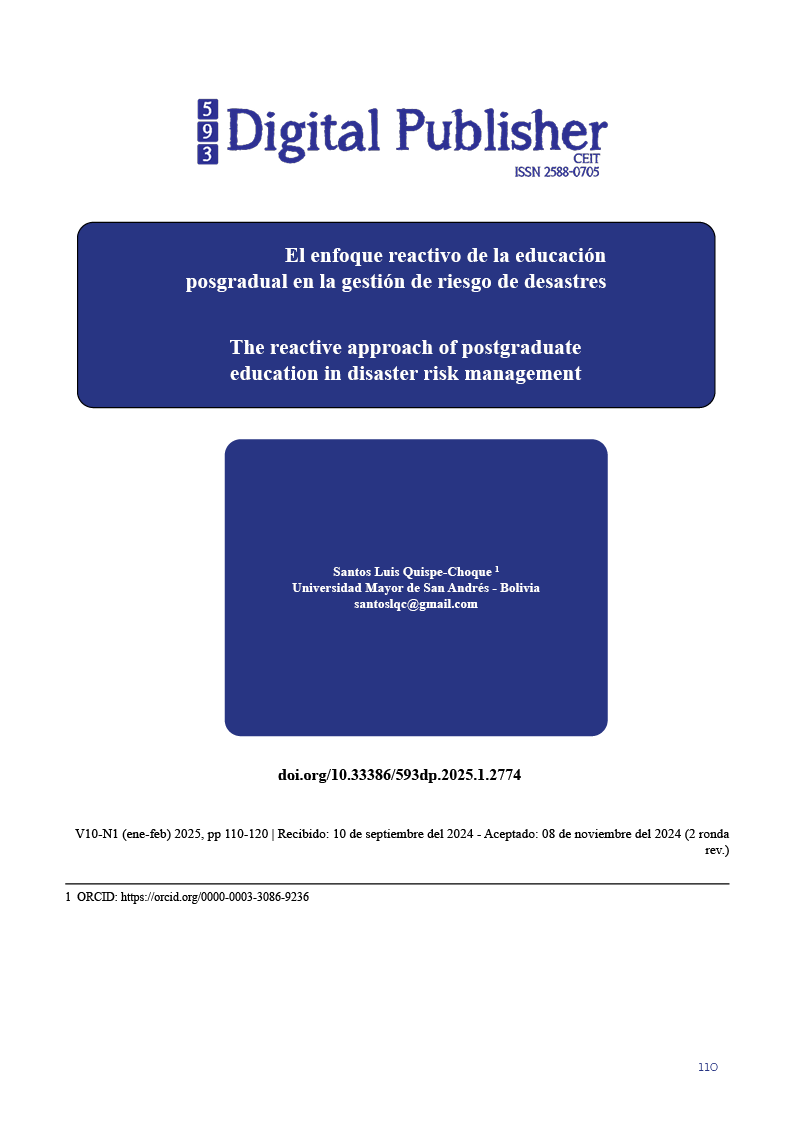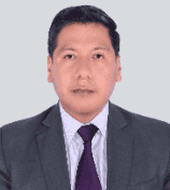The reactive approach of postgraduate education in disaster risk management
Main Article Content
Abstract
The purpose of the research is to describe disaster risk management in postgraduate education, which has a predominantly reactive approach. This analysis focuses on the Universidad Mayor de San Andrés, located in the city of La Paz, Bolivia. The method applied in the research was the analytical-synthetic one, which allowed to analyze the curricular plan of the Diploma in Risk Management of the Universidad Mayor de San Andrés, synthesizing that this document has a reactive approach. Also through this method, a virtual survey was carried out to the graduated students who took this postgraduate program, allowing to show that the students perceive that the diploma in risk management is characterized by a combination of reactive and proactive approaches, although this duality is not directly related to the analyzed curricular plan, but rather to the teaching methodology used by the teachers. This finding highlights the importance of implementing a postgraduate program at the Universidad Mayor de San Andrés through a Master's Degree in Disaster Risk Management and Climate Resilience. This master's degree must have a curricular plan focused on Disaster Risk Reduction, Disaster and/or Emergency Response, Resilience and Climate Change.
Downloads
Article Details

This work is licensed under a Creative Commons Attribution-NonCommercial-ShareAlike 4.0 International License.
1. Derechos de autor
Las obras que se publican en 593 Digital Publisher CEIT están sujetas a los siguientes términos:
1.1. 593 Digital Publisher CEIT, conserva los derechos patrimoniales (copyright) de las obras publicadas, favorece y permite la reutilización de las mismas bajo la licencia Licencia Creative Commons 4.0 de Reconocimiento-NoComercial-CompartirIgual 4.0, por lo cual se pueden copiar, usar, difundir, transmitir y exponer públicamente, siempre que:
1.1.a. Se cite la autoría y fuente original de su publicación (revista, editorial, URL).
1.1.b. No se usen para fines comerciales u onerosos.
1.1.c. Se mencione la existencia y especificaciones de esta licencia de uso.
References
Alavez, G. (2017). Google forms como instrumento de medición de conocimientos. Revista Vinculando, 15(1). https://vinculando.org/beta/google-forms-instrumento-medicion-conocimientos-basicos.html
Bello, O., Bustamante, A., & Pizarro, P. (2020). Planificación para la reducción del riesgo de desastres en el marco de la Agenda 2030 para el Desarrollo Sostenible. Documentos de Proyectos (LC/TS.2020/108). Comisión Económica Para América Latina y El Caribe - CEPAL., 62. http://bibliotecadigital.ciren.cl/discover?query=Cambio+Climático+y+Desastres+Naturales++Una+perspectiva+Macrorregional%2C+2020
CEUB. (2023). Modelo Eduactivo del Sistema de la Universidad Boliviana 2023 - 2028. https://ceub.edu.bo/doc/sen/Modelo Educativo SUB 2023versión final.pdf
Espinoza, E., & Toscano, D. (2015). Metodología de la investigación técnica y educativa. In Ediciones UTMACH (Issue p).
Freire, P. (2009). La educación como práctica de la libertad (p. 154). https://asslliuab.noblogs.org/files/2013/09/freire_educación_como_práctica_libertad.pdf_-1.pdf
Gadotti, M. (2003). Perspectivas Actuales de la Educacion (primera ed, Vol. 148). https://www.google.com.bo/books/edition/Perspectivas_actuales_de_la_educación/6owXBm6DAEUC?hl=es&gbpv=1&kptab=overview
García, R. (2000). El conocimiento en construcción (Issue 112). https://repositorio.esocite.la/id/eprint/653
Gonfiantini, V. (2023). La reforma de la educación y la religación del conocimiento. 593 Digital Publisher CEIT, 8(3), 552–562. https://doi.org/10.33386/593dp.2023.3.1804
Guillin-Aldas, P. (2024). Reactividad en Gestión del Riesgo: Intervenciones en San Pablo, Balzapamba y San José, Bolívar, Ecuador. 593 Digital Publisher CEIT, 9(3), 193–210. https://doi.org/10.33386/593dp.2024.3.2387
Ley de Gestión de Riesgos, (2014). Ley de Gestión de Riesgos de Bolivia. http://www.defensacivil.gob.bo/web/uploads/pdfs/Ley-y-reglamento.pdf
Nicolescu, B. (1996). La transdisciplinariedad Manifiesto (7 saberes (ed.); 1st ed.).
Ortiz, V. (2017). Revisión documental: el estado actual de las investigaciones desarrolladas sobre empatìa en niñas y niños en las edades comprendidas entre los 6 a 12 años de edad surgidas en países latinoamericanos de habla hispana, entre los años 2010 al primer trimestre 2017 (Vol. 11, Issue 1, pp. 92–105).
Ramírez-montoya, M. S., Basabe, F. E., Arroyo, M. C., Azeneth, I., & Zúñiga, P. (2024). Modelo abierto de pensamiento complejo para el futuro de la educación. Modelo Abierto de Pensamiento Complejo Para El Futuro de La Educación. https://doi.org/10.36006/16422-1
Rosales, J. (2021). Historical Evolution of the Conception of Disaster Risk Management: Some Considerations. Revista Kawsaypacha: Sociedad y Medio Ambiente, 2021(7), 67–81. https://doi.org/10.18800/kawsaypacha.202101.004
Velado, S. (2012). Papel de la Educación Superior en la RRD: Un Protagonista Imprescindible Page 1. 1–10. https://www.agr.una.py/descargas/biblioteca_digital_gestion_riesgos/P/PAPEL DE LA EDUCACION SUPERIOR EN LA RRD. docx.pdf
Sharma, N., Nitivattananon, V., Tsusaka, T. W., & Pandey, R. (2024). An Application of the Stakeholder Theory and Proactive-Reactive Disaster Management Principles to Study Climate Trends, Disaster Impacts, and Strategies for the Resilient Tourism Industry in Pokhara, Nepal. International Journal of Sustainable Development and Planning, 19(4), 1337–1346. https://doi.org/10.18280/ijsdp.190411
Tobón, S. (2005). Formación Basada en Competencias. In Angewandte Chemie International Edition, 6(11), 951–952. (1 Ed.)
UNISDR. (2015). Marco de Sendai para la Reducción del Riesgo de Desastres 2015-2030. Resolución Aprobada Por La Asamblea General El 3 de Junio de 2015, 26. http://www2.ohchr.org/spanish/bodies/hrcouncil/docs/gaA.RES.60.1_Sp.pdf
Real Academia Española. (3 de agosto de 2024). Supuesto. https://dle.rae.es/supuesto
Real Academia Española. (3 de agosto de 2024). Paradigma. https://dle.rae.es/paradigma


